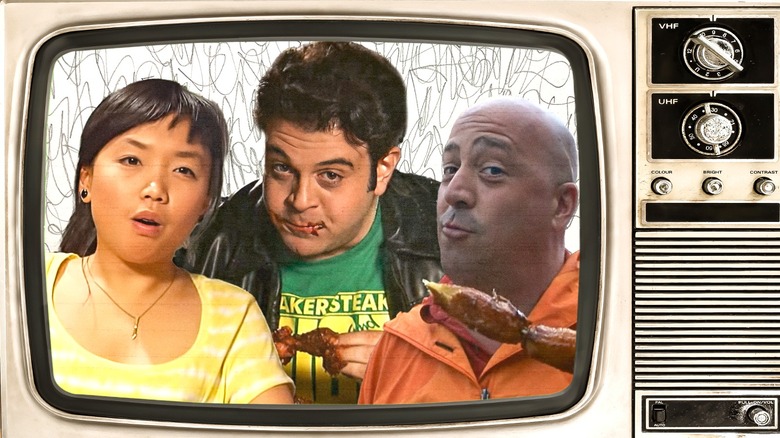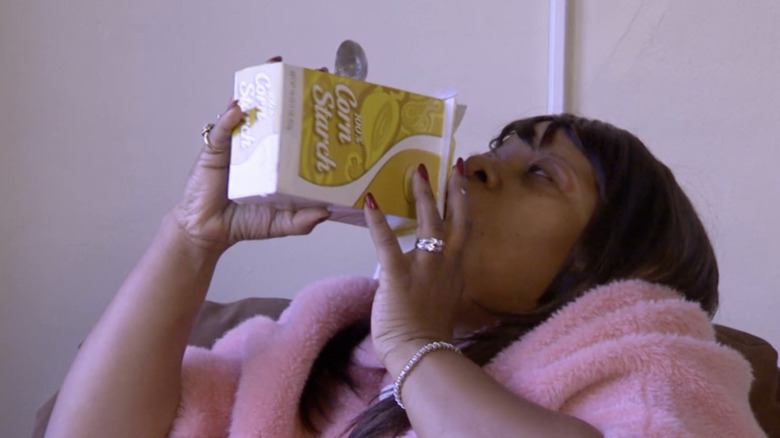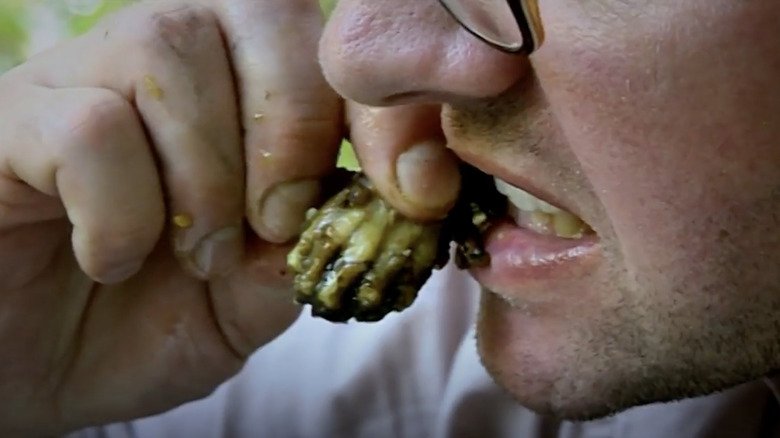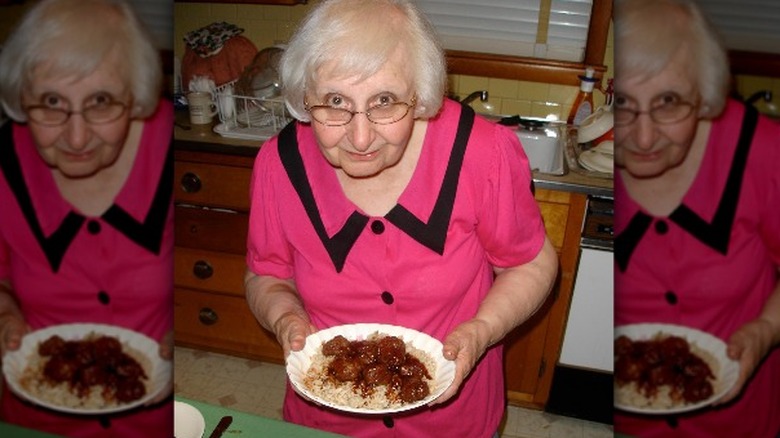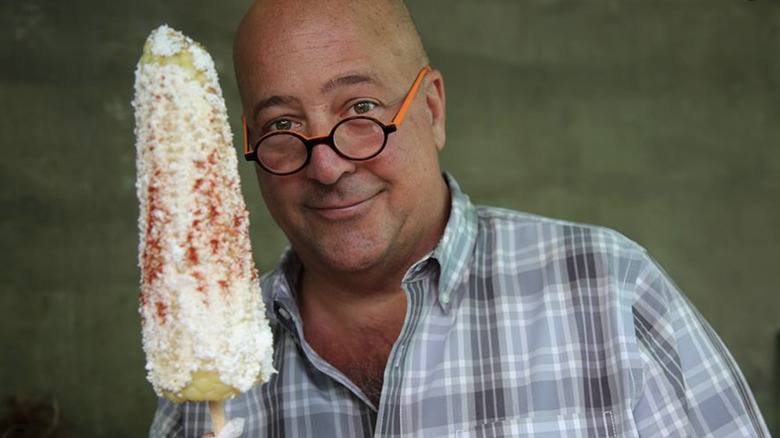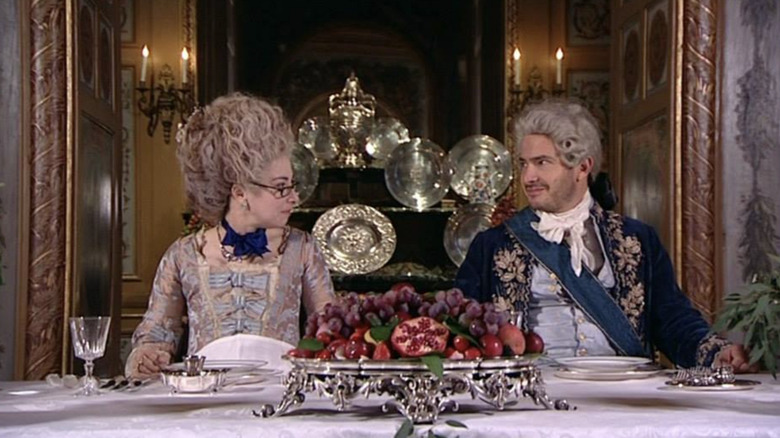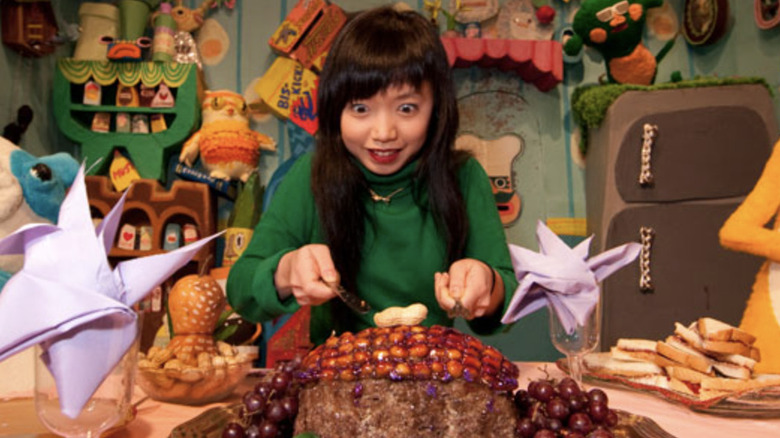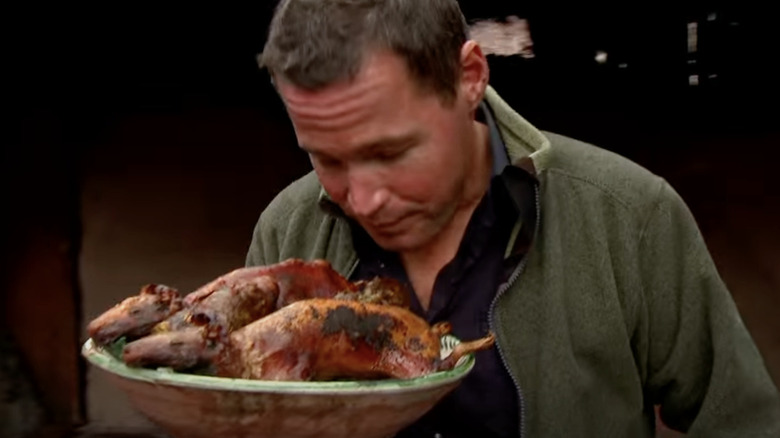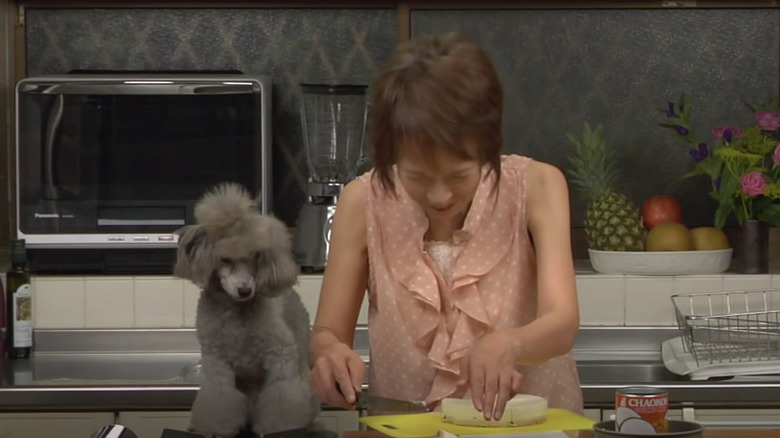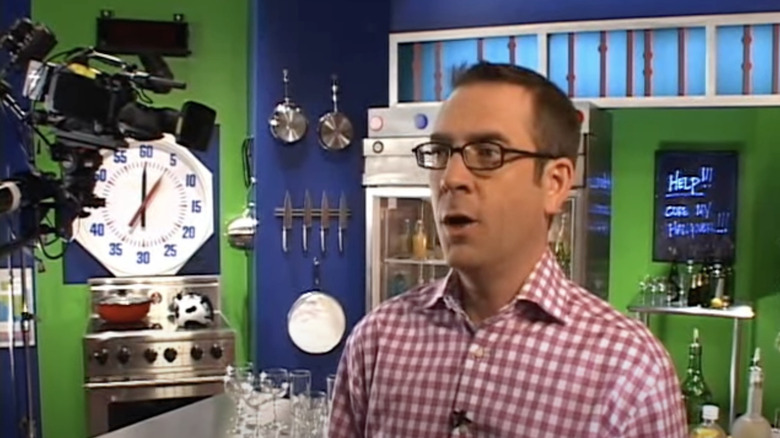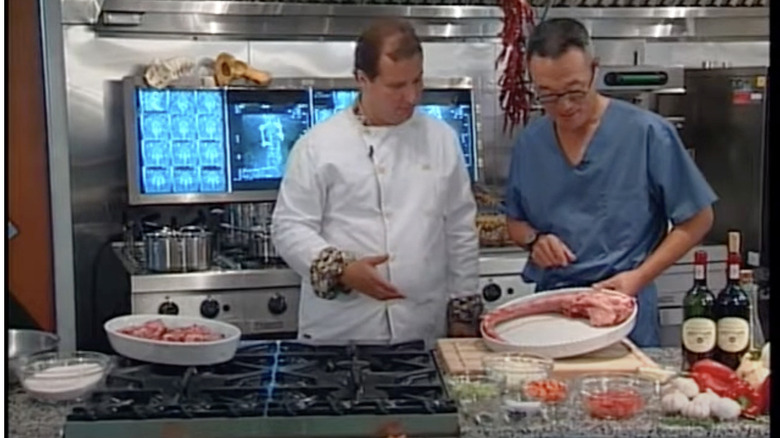Strangest Food TV Shows Of All Time
We may receive a commission on purchases made from links.
Things have come a long way since the first American cooking show hit the airwaves back in 1946. Hosted by chef and cookbook author James Beard, "I Love to Eat" saw the jolly foodie share his recipes with viewers mostly composed of middle-class housewives. While "I Love to Eat" may have been discontinued within a year, the void left by its absence was gradually filled by a multitude of other cooking shows. Recent food series such as "MasterChef" and "Parts Unknown" have gone beyond simply showcasing the culinary abilities of skilled chefs. They have become platforms for exploring diverse cuisines, cultures, and cooking techniques.
While there's no shortage of television shows centered around food, they vary in content, quality, and appeal. Some are short-lived while others manage to capture the imaginations of foodies for years and even decades. Some follow the same tried-and-tested format while others dare to venture outside the culinary box and try something different. It's these hidden — or not so hidden — gems that have piqued our interest. From series that explore unusual culinary creations and debunk gastronomic myths to those that push the boundaries of conventional logic, each of these shows has its own unique way of entertaining viewers.
Ready for some offbeat entertainment? Check out our roundup of the strangest food TV shows of all time!
Freaky Eaters
Whether it's an insatiable craving for sweets or a penchant for spicy fare, we all have our culinary preferences. However, while most of us can keep our tastes in check, this isn't the case for everybody. "Freaky Eaters" is dedicated to the select group of people who push their food-related obsessions to the extreme. Each of the show's episodes documents the trials and tribulations of one individual as they struggle to deal with a specific food addiction. The show is hosted by psychotherapist Mike Dow and nutritionist J.J. Virgin, who do their best to help their "patients" overcome their culinary addictions over the course of a week.
From fixations with fast food staples such as cheeseburgers and pizza to more unusual obsessions like raw meat and tartar sauce, the dependencies documented by "Freaky Eaters" are as varied as each individual. For instance, episode 6 of season 1 sees Virginia and Mike coach Amy, a woman who has been drinking 30 cans of Coca-Cola per day since moving to America. In a similar fashion, in episode 5 of season 2, the duo comes to the rescue of Whitney Bishop, who has been living on a liquid diet since a traumatizing choking incident.
The U.S. version of "Freaky Eaters," which ran on TLC between 2010 and 2011, is based on a BBC Three television series of the same name that aired between 2007 and 2010.
Cooking in the Danger Zone
Hosted by food writer and broadcaster Stefan Gates, "Cooking in the Danger Zone" delves into the unique food cultures of countries affected by conflicts or natural disasters. Originally aired on BBC from 2007 to 2008 over three seasons, the show offers a captivating glimpse into how people from diverse backgrounds adapt to cooking with limited resources. Moreover, the series also showcases food as a unifying force that has the power to bring communities together, even in the most challenging circumstances.
Gates' journey takes him to far-flung locations such as war-ravaged Afghanistan, where he shares a meal with a former Taliban commander and has a close call with a Russian "Scud" missile, a haunting reminder of past conflicts in the region. The intrepid gourmand also visits Chernobyl, the location of one of the world's most disastrous nuclear accidents, where he enjoys a questionable meal prepared with produce from a local veggie garden and goes mushroom hunting. Throughout the course of the show, we also witness Gates indulge in a yak's penis with Chinese Communists, sample a rotting walrus alongside the Inuit people of the Canadian Arctic, and try rat meat with India's Dalits.
Feed Me Bubbe
Starring Bayla Scher, or Bubbe, which translates to grandmother in Yiddish, "Feed Me Bubbe" is the brainchild of Avrom Honig, a keen foodie and an ardent fan of his grandmother's cooking. As charming as it is low-key and low-budget, the show made its debut on Instant Media in 2006, quickly becoming one of the network's most beloved series.
In addition to instructing viewers how to make one Jewish specialty, each short episode also sees Bubbe teach her grandson Avrom a "Yiddish Word of the Day." And since most of the food prep is done before the cameras start rolling, during each episode Bubbe gets time to not only put the finishing touches on the dish but also recount anecdotes from her past and invaluable life wisdom. There's also a segment called "Ask Bubbe" where the adorable grandma responds to viewer questions.
In 2011, Bubbe's culinary and life wisdom was compiled in "Feed Me Bubbe: Recipes and Wisdom from America's Favorite Online Grandmother." While Bubbe passed away in 2014 at the ripe old age of 87, her legacy lives on in the kitchens and hearts across America.
Bizarre Foods with Andrew Zimmern
If you're passionate about armchair travel and have a taste for unconventional cuisine, you shouldn't miss "Bizarre Foods with Andrew Zimmern." In this captivating series, the renowned chef and television personality embarks on culinary adventures, where he discovers exotic dishes that push the boundaries of what we traditionally consider food. The long-standing program made its debut on the Travel Channel in 2006 with a pilot episode that saw Zimmern indulge in frog sashimi in Tokyo, fruit bat in Chiang Mai, and durian in Penang. Over the years, the fearless gourmand has traveled to hundreds of locations around the globe for our viewing pleasure, undauntedly sampling such exotic delights as rat hearts, biting ants, and calf testicles.
While some of the food presented on "Bizarre Foods" may initially seem shocking or unappetizing, Zimmern's primary focus lies in capturing the cultural importance of these unconventional culinary offerings. Instead of relying on shock value to boost ratings, he encourages viewers to develop an appreciation for the rich tapestry of traditions and flavors that shape different cultures.
While Zimmern isn't afraid to put himself on the line when it comes to consuming the unusual and the unexpected, the only ingredient that's left a lasting effect on his health has been cumin he tried in North Africa in 2005. "Occasionally once a year I have a flare-up of a rare disease called burning mouth syndrome. I pass it off as a simple casualty of war," Zimmern wrote on Reddit.
The Supersizers Go...
"The Supersizers Go..." is a British TV series that sees food critic Giles Coren and comedian Sue Perkins (of Great British Bake-Off fame) boldly embrace the food and lifestyles of different historical eras. And the results aren't just educational, they're also a great laugh. In their pursuit of knowledge, the duo not only dons the appropriate period attire for each episode but also indulges in the pursuits and cuisines of the specific time period.
To enhance their culinary experience, skilled guest chefs meticulously prepare the food, allowing Coren and Perkins to savor the authentic flavors of each era. Moreover, during the filming of each episode, the duo spends the week in a location that encapsulates the very essence of the historical period being explored. For instance, in the episode that takes them back to World War II, Coren and Perkins try Tube bomb shelter rations of the time at ... you guessed it ... a Tube station. Meanwhile, the Elizabethan episode sees Perkins learn the lute and Coren try cupping in between feasting on delicacies such as sheep's head and offal.
The BBC series, which later aired on the Cooking Channel in 2012, also has a health-related component. Prior to embarking on each journey of discovery, Coren and Perkins get a medical test that records their vital signs. Upon the culmination of the week-long experience, these tests are repeated to unveil any changes that may have occurred as a result of their new diet and habits.
Food Party
If you're in search of professionalism and a show to teach you a thing or two about cooking, it would be best to explore other options. "Food Party" couldn't be further from the conventional format of instructional cooking shows. Instead, the series presents a completely surreal experience that transports viewers into a whimsical world of colorful puppets, imaginative adventures, and extraordinary culinary creations.
Filmed against a backdrop of pastel-hued cardboard sets, "Food Party" is hosted by Thu Tran, whose energy is nothing short of infectious. During each 15-minute episode, Tran embarks on various adventures and interacts with guests as she prepares an imaginative feast. From crashing a nudist picnic to giving birth to a kitten, the show sees Tran immerse herself in extraordinary scenarios that add to its unique charm.
Originally available exclusively online, the out-of-this-world series eventually made its way to the Independent Film Channel. The show was axed in 2010 after two seasons, which probably came as a disappointment to the many viewers who gave it positive feedback. One impressed reviewer called the show a "rare gem," adding, "[It's] silly, weird, unique, low budget, creative, dumb, and hilarious. It always manages to get a laugh out of me." Another reviewer agrees, saying, "I didn't think this show was real when I first saw it... however, when I confirmed that I hadn't fallen through a portal and into some sort of alternate universe, I was floored by its awesomeness."
Extreme Cuisine with Jeff Corwin
Hosted by a wildlife conservationist and anthropologist, "Extreme Cuisine with Jeff Corwin" explores different cultures from around the globe through extreme culinary practices. The reality show, which premiered on the Food Network in 2009, sees Corwin showcase regional dishes and explore their vital place in shaping the social fabric of each region.
While the show features Corwin indulging in exotic delicacies, including ants and other insects, it does so with a purpose that transcends mere shock value. Rather than focusing on sensationalism, Corwin highlights the cultural context behind these extreme culinary experiences. "I want people to sort of get out of their refrigerator and not think about a supermarket and maybe think about a family that lives in the mountains of Peru at 13,000 feet. Not only do they not have refrigeration, they don't even have electricity," Corwin explained in an interview with Eclipse Magazine.
During his sojourns around the globe, Corwin not only ventures into unusual culinary territories but also delves into the art of sourcing food. While in Hawaii, he scales a coconut tree in search of coconuts. His journey also takes him to Morocco, where he inspects goat dung for argon nuts. Despite his insatiable curiosity, there's one food that had Corwin doing a double take. "The one thing that kinda got me — not nervous — but when we rolled over a log and saw giant wood larvae, I thought, how the hell do we eat this?," he told Chron.
Cooking with Dog
If you thought that cooking endeavors and a talking dog would never coexist on a television show, prepare to be surprised. Granted, "Cooking with Dog" isn't a TV series per se — it's actually a YouTube show — but don't let this diminish this masterpiece's worth. The main star of the Japanese series is Francis, a demure toy poodle who gives cooking instructions in English to his sidekick only known as the Chef.
Since its inception in 2007, "Cooking with Dog" has reached a significant following, amassing an impressive collection of more than 380 videos and 1.6 million YouTube subscribers. The show's popularity can be attributed to its distinctive blend of humor and quirkiness. For instance, in a video about making Takoyaki octopus tempura, Francis reassures viewers, "There are many tentacles but don't be scared. They will not attack you." However, the show offers more than just entertainment; it's also practical, with each episode focusing on how to prepare an affordable and tasty Japanese recipe.
Like all good things, "Cooking with Dog" came to an end in 2016 when Francis the dog passed away at the age of 14, concluding his nine years in the spotlight.
Food Detectives
In "Food Detectives," food expert Ted Allen and his team use science to explore culinary mysteries and common food myths. The unflinching sleuths of the Food Network show tackle a variety of burning questions, including the safety of eating food that's been on the ground for less than five seconds and whether swallowing chewing gum means that it will be in your gastric system for the next seven years. The series also delves into some common food-related conundrums such as why we get brain freeze, how to deal with bad breath, and whether eating MSG affects one's health.
"Food Detectives," which debuted in 2008 and aired for two seasons, received mixed reviews. According to Grub Street, the show's problem doesn't lie with its concept, but rather with the host. "The guy is boring! His expression never changes, he never says anything insightful about food, and he's about as funny as a CAT scan," the article states. On the other end of the scale, one reviewer praised the show for being relatable, adding, "Despite how much you consider yourself to be a 'knowledgeable foodie' or not ... this program has something for everyone! 'Food Detectives' helps establish an appreciation for not only the foods we eat every day but also for how amazing our bodies are in processing and utilizing [it]."
Cookin' Good With the Cola Sisters
"Cookin' Good With the Cola Sisters" aired on Public Access Television in Austin, Texas, which has been entertaining the public since its inception in 1973. Rated as the Best Public Access TV Show of 2008, "Cookin' Good" features Shasta and Arcie Cola, two eccentric sisters with big personalities and a passion for gastronomic wizardry. Devon from Mondo Shop calls the duo "a country fried version of 'Absolutely Fabulous'," which seems like a pretty accurate description considering the siblings' blend of glitzy flare and homely charisma.
Despite its name, the series sees the Cola sisters do more drinking and delving into conspiracy theories than cooking. And it's precisely this unscripted, conversational nuance that sets the show apart and keeps the audience entertained. The sisters' interactions with each other are complemented by conversations with the off-screen cameraman, only adding to the already bizarre dynamic of the show.
Confused? So are we! To complicate matters further, when talking about the guiding philosophy behind "Cookin' Good," Arcie shared the following insight with Meghan Ruth Speakerman from the Austin Chronicle, "The most important thing is to eat fresh, healthy, organic food that is minimally processed, because otherwise you're eating nothing but chemicals the Man is trying to feed you so that you will die."
Close to the Bone: Surgeons & Chefs
The brainchild of orthopedic surgeon Richard Hu, "Close to the Bone: Surgeons & Chefs" delivers just what its name suggests. Blending medicine and culinary arts, the eight-part Fresh Cut Entertainment series uncovers the fascinating parallels between these two seemingly unconnected disciplines. Each episode is hosted by lawyer-turned-chef Allan Shewchuk, who takes viewers on culinary adventures that include a stop at the butcher's and an intriguing insight into human and animal anatomy.
Shot in a studio that combines elements of a kitchen and an operating theater, "Close to the Bone: Surgeons & Chefs" invites skilled surgeons to don their chefs' hats and create two dishes fit for even the fussiest carnivores. Interestingly, the show takes each surgeon's realm of expertise as a starting point, weaving it into the culinary narrative. For instance, the series sees urologist Gerry Todd showcase his culinary skills by crafting a lamb kidney dish and deep-fried bull's testicles. Meanwhile, Gary Gelfand, a thoracic surgeon, impresses viewers by preparing two different types of ribs.
